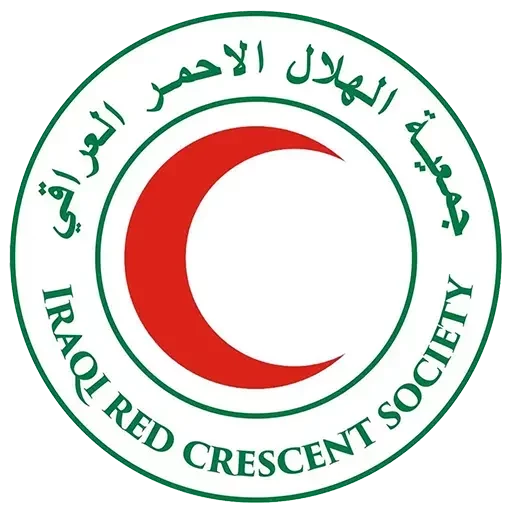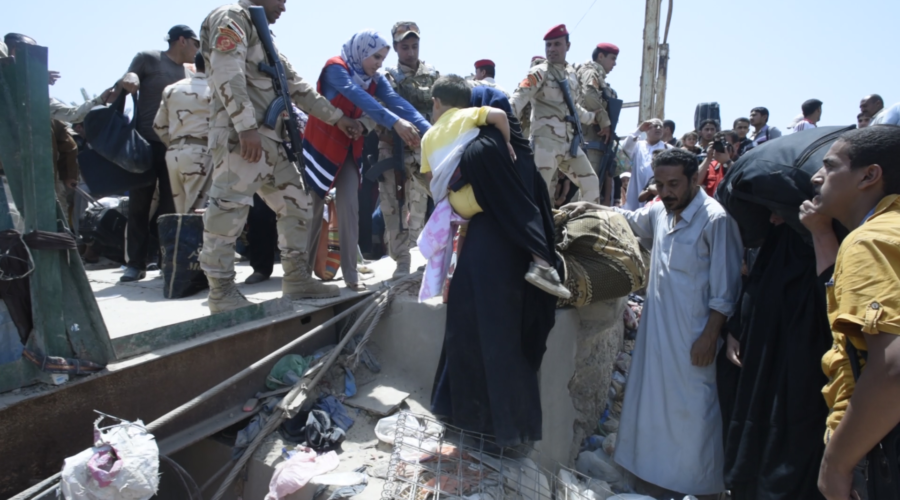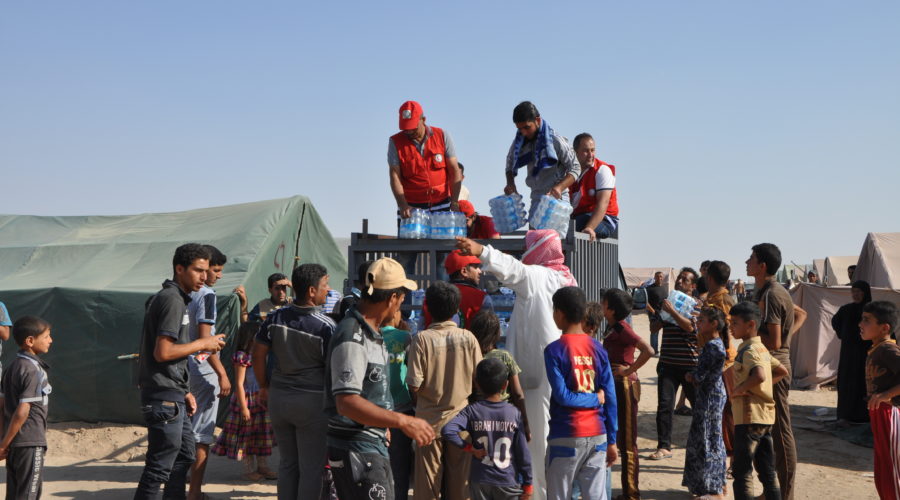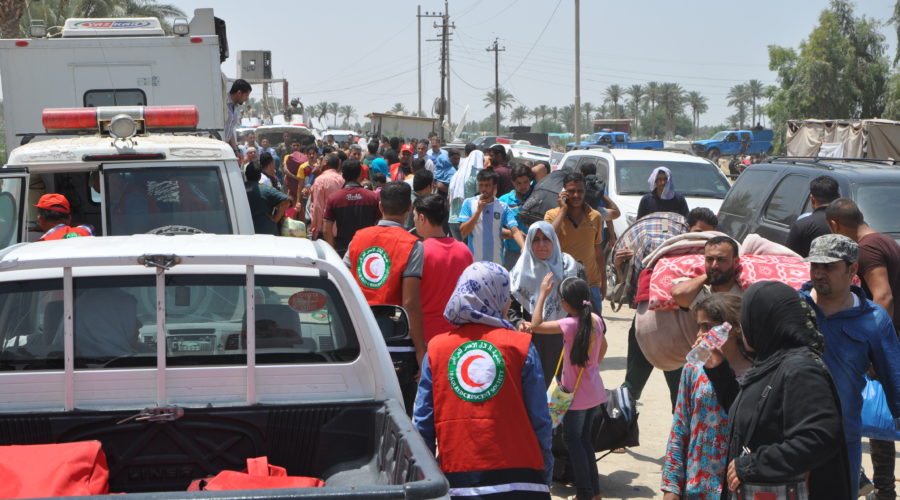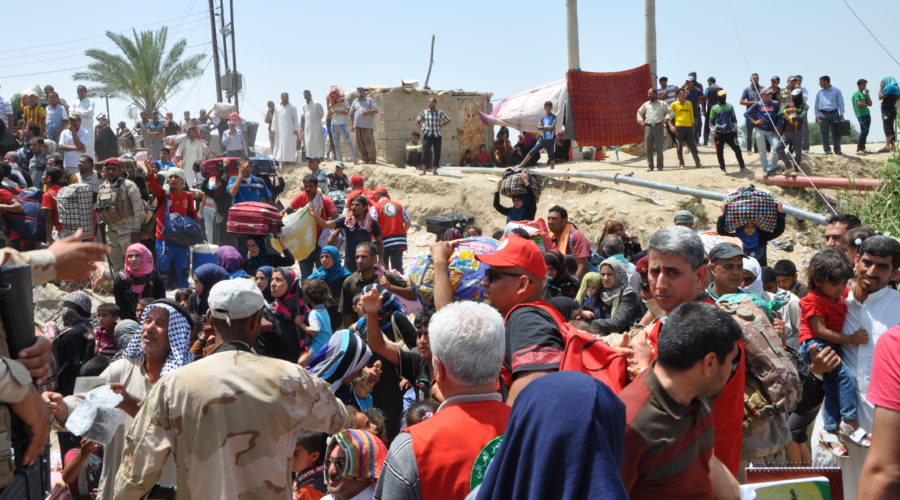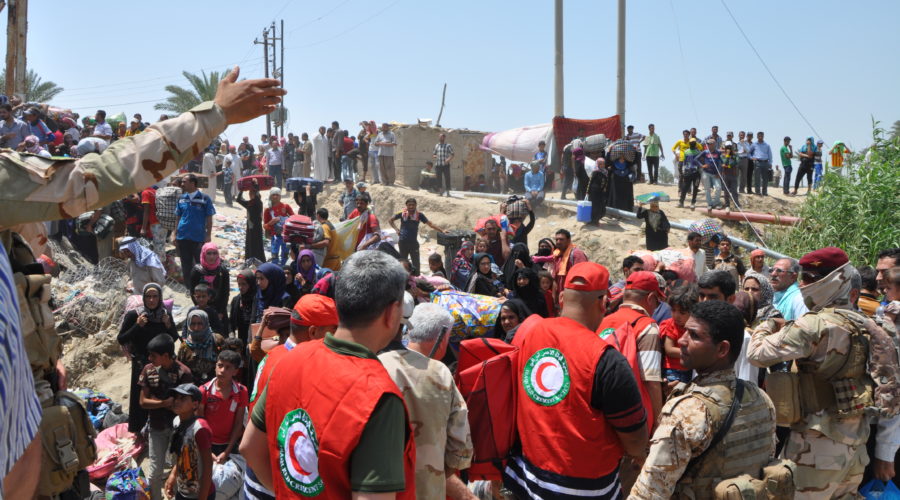The displaced people from Anbar living in difficult humanitarian conditions, and the Iraqi Red Crescent is making extraordinary efforts to relief
BAGHDAD / Mohammed al-Khuzai
Since mid-April 2015, the security situation in Anbar governorate led to the displacement of a large number of local residents, according to an assessment conducted by the Iraqi Red Crescent’s volunteers the total number of displaced people during the past month is more than (132,000) displaced people. The IDPs fled to a number of cities that are located in the outskirts of Anbar governorate like (Amiriyat al-Fallujah, which is 30 k / m from center of the governorate, Al- Habbaniyah that is 23 km from the center of the governorate and Al-Khalidiya which is 25 km from the center of the governorate). The assessment further reveled that more than 40000 displaced people are staying in public places, buildings under construction, schools and mosques. Approximately (20,000) are hosted in AlAmal, Bisebis, Al-Caravanat camps. While a total of (72,000) IDPs have taken refuge in capital Baghdad and some other Iraqi governorates.
The information indicates that (42,000) displaced people were previously displaced before and returned to their towns and were forced again to flee for the second time after the recent events.
In this regard, Abu Samer, who fled Ramadi to Ameriyah Al-Fallujah said that “we were forced to move at the beginning of last year 2014, as I and my family to refuge in Ameriyah Al-Fallujah as a result of security situation in our city, we stayed for more than two months and then we went back to our house after the returned after the security situation improved, but that did not last for a long time as we flee again and now we live in the camp and we need to be helped”.
While Ameer’s mother (a mother of three children) from Al-Sofia area in Anbar who camped at Al- Al-Khalidiya area said that “ Since the early events of Anbar last year, I was forced to flee to my relatives in Al-Khalidiya area and after the security situation get calmed in our areas I went back to live in my house at Al-Sufeea as I owned a small shop that help me to assist my kids, and after renewed of armed clashes I was displaced again with my children and I went back to my relatives in Al-Khalidiya area).
For the past five days, (Bzabz) crossing that links Baghdad and Al-Anbar got huge numbers of displaced families from the city of Ramadi(Anbar center) due to its fall. Hundreds of these families were forced to stay in the desert for more than four days before they were allowed entre the capital Baghdad. This has resulted to the aggravation of the humanitarian crisis for the displaced communities, as the majority of these families left their homes without being able to carry their money or personal belongings. Thousands of them has lost their livelihoods which has further resulted economic challenges of the displaced communities .
Ahmed Abdel Rahman, the director of Disaster Management in the Iraqi Red Crescent said that “our volunteers are making a special effort seeking to limit the humanitarian crises due to the large numbers of families displaced. The immediate needs include shelters, food, water and health services, despite the IRCS relief support to cover the needs of displaced people, more than 25,000 families still need this assistance”. During the past five days the Red Crescent teams were able to cover some of the emergency needs of more than ten thousand families through distributing more than (15,000)fifteen thousand dry and hot meal, approximately 5,000 food parcels as well as providing more than (82000) bottle water.
Regarding the impact of relief operations by Iraqi Red Crescent, Ahmed Khalaf one of the displaced people living in a school at Ameriyat al-Fallujah said “We depend mainly on the assistance that is provided to us because we have no other source to get food, water and the other basic requirements, the assistance of the Iraqi Red Crescent helped in meeting a lot of our needs. However many families are still in need of help”.
Parallel to that, the opportunities to get medical treatment is very limited due to the increase in health problems, especially with the regard to chronic diseases and lack of access for treatment. To address this need, the Iraqi Red Crescent form mobile health teams which are providing health services in the camps, public places, as well as along the roads which is used by displaced people. “The IRCS volunteers who are trained to implement health awareness campaigns, provide first aid services and psychosocial support were mobilized to provide services to the IDPs”, Dr. Ali Majid, the Director of the health department in the Iraqi Red Crescent said, “we formed groups of health teams who are working in the field throughout the day to provide first aid services, psychosocial support, medical services. In the first, 5 days we helped (19469) displaced. And as a result of fatigue cases which occurred during the past few days due to high temperatures and walking for long distances there were many cases of collapsed IDPs. To further respond to the desperate situation the Iraqi Red Crescent mobilized a number of ambulances to transport patients”.
Since the beginning of 2014 till now, Anbar governorate witness an deterioration of the security situation that leads to deterioration of humanitarian situation that causes displacement operations from time to time, as the number of displaced people since the beginning of the mentioned year till now was more than 500,000 displaced people, most of them are still in need for help.
